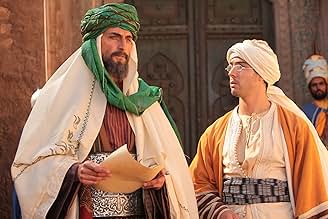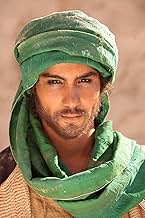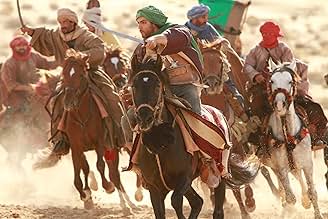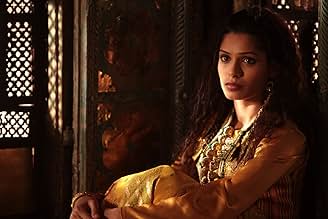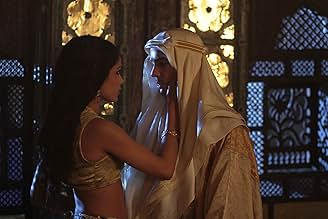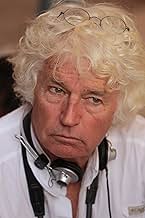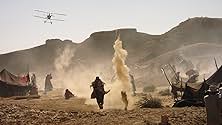NOTE IMDb
6,6/10
13 k
MA NOTE
Se déroulant dans les États arabes des années 1930 à l'aube du boom pétrolier, l'histoire est centrée sur un jeune prince arabe déchiré entre l'allégeance à son père conservateur et son beau... Tout lireSe déroulant dans les États arabes des années 1930 à l'aube du boom pétrolier, l'histoire est centrée sur un jeune prince arabe déchiré entre l'allégeance à son père conservateur et son beau-père libéral moderne.Se déroulant dans les États arabes des années 1930 à l'aube du boom pétrolier, l'histoire est centrée sur un jeune prince arabe déchiré entre l'allégeance à son père conservateur et son beau-père libéral moderne.
- Réalisation
- Scénario
- Casting principal
- Récompenses
- 1 nomination au total
Avis à la une
In the beginning of the Twentieth Century, in Arabia, Emir Nesib (Antonio Banderas) of Hobeika defeats Sultan Amar (Mark Strong) of Salma after years of war between their tribes and they make a peace treaty creating "The Yellow Belt", a large no man's land that would separate their lands and would not belong to neither of them. Further, Nesib demands the sons of Amar, Saleh and Auda, to be raised together with his children Tarik and Leyla by him in Hobeika as a guarantee of their agreement.
Fifteen years later, representatives of the Texas Oil find oil in the Yellow Belt and the modern and liberal Emir Nesib sees the opportunity to improve and modernize the life of his tribe, building hospitals and schools, and the American Company begins the exploitation of the oil field, violating the peace pact.
Nasib sends a representative to make an agreement with the fundamentalist Sultan Amar, but he does not accept the offer. Saleh decides to travel to Salma to talk to his father and kills his two companions, but he is captured and murdered by Tarik. Prince Auda (Tahar Rahim) and Princess Leyla (Freida Pinto) are in love with each other since they were children and they get married with the full permission of Nesib. Auda travels to Salma expecting to convince his father to associate to Nesib, but the conservative Amar does not accept the proposal and decides to fight against Nesib. Now, Prince Auda shall decide in which side he will pick and fight.
"Black Gold" is another wonderful epic adventure by the French director Jean-Jacques Annaud with a great international cast and wonderful cinematography in an environment of "Lawrence of Arabia". The story is entertaining, the soundtrack is very beautiful and the DVD has magnificent Extras showing the Making Of and the Special Effects. My vote is eight.
Title (Brazil): "O Príncipe do Deserto" ("The Prince of the Desert")
Fifteen years later, representatives of the Texas Oil find oil in the Yellow Belt and the modern and liberal Emir Nesib sees the opportunity to improve and modernize the life of his tribe, building hospitals and schools, and the American Company begins the exploitation of the oil field, violating the peace pact.
Nasib sends a representative to make an agreement with the fundamentalist Sultan Amar, but he does not accept the offer. Saleh decides to travel to Salma to talk to his father and kills his two companions, but he is captured and murdered by Tarik. Prince Auda (Tahar Rahim) and Princess Leyla (Freida Pinto) are in love with each other since they were children and they get married with the full permission of Nesib. Auda travels to Salma expecting to convince his father to associate to Nesib, but the conservative Amar does not accept the proposal and decides to fight against Nesib. Now, Prince Auda shall decide in which side he will pick and fight.
"Black Gold" is another wonderful epic adventure by the French director Jean-Jacques Annaud with a great international cast and wonderful cinematography in an environment of "Lawrence of Arabia". The story is entertaining, the soundtrack is very beautiful and the DVD has magnificent Extras showing the Making Of and the Special Effects. My vote is eight.
Title (Brazil): "O Príncipe do Deserto" ("The Prince of the Desert")
Super-high production values here. That's why I rented it. I knew they'd spent some money. To some(me too, initially), it looks like a "B" flick you've never heard of.
In that regard it might exceed some people's expectations.
In hindsite, however, the story is an excellent platform for a great drama, but unfortunately, that drama never comes to fruition.
And I'm not sure why. The film needed more dialog between its lead character(Auda, played by Tahir from 'A Prophet' fame), and both of his "fathers". We get far too little quality acting and dialog, and way too much meandering amongst the desert. Mark Strong is excellent as usual - too bad he has 5 or 6 lines in the entire film(most coming in the first 10 minutes).
The film should have worked dynamically, but the lack of quality dialog and the lack of drama ruin the film. One of many balls that were dropped. The "falcon" storyline and connection - also dropped like a 16-pound bowling ball. The final scene between Banderas and Rahim, ditto.
Watch this film for what it should have been - one of the best made for TV epics ever put on the living room screen.
The film deserves some credit for not selling-out to the geek squad, and for not boring me(entirely), but the film really could have been great.
It's quite beautiful to look at, and most of the acting is passable, but again, it lacks the drama to give it the emotional power to match its 'look'.
60/100 and considering it's 50 million-dollar budget - I won't be adding it to the B-Movie-Marathon anytime soon(even though its total-lack of box-take makes it eligible).
not bad for out-of-the-redbox with low-expectations.
In that regard it might exceed some people's expectations.
In hindsite, however, the story is an excellent platform for a great drama, but unfortunately, that drama never comes to fruition.
And I'm not sure why. The film needed more dialog between its lead character(Auda, played by Tahir from 'A Prophet' fame), and both of his "fathers". We get far too little quality acting and dialog, and way too much meandering amongst the desert. Mark Strong is excellent as usual - too bad he has 5 or 6 lines in the entire film(most coming in the first 10 minutes).
The film should have worked dynamically, but the lack of quality dialog and the lack of drama ruin the film. One of many balls that were dropped. The "falcon" storyline and connection - also dropped like a 16-pound bowling ball. The final scene between Banderas and Rahim, ditto.
Watch this film for what it should have been - one of the best made for TV epics ever put on the living room screen.
The film deserves some credit for not selling-out to the geek squad, and for not boring me(entirely), but the film really could have been great.
It's quite beautiful to look at, and most of the acting is passable, but again, it lacks the drama to give it the emotional power to match its 'look'.
60/100 and considering it's 50 million-dollar budget - I won't be adding it to the B-Movie-Marathon anytime soon(even though its total-lack of box-take makes it eligible).
not bad for out-of-the-redbox with low-expectations.
They don't make many movies like this anymore, it felt like somebody had discovered a lost gem from the 1970s, with real extras, real horses and real camels instead of the soulless computer copies of todays CGI productions. I loved it! Also the story remained interesting, when the Prince has a difficult decision to make whose side he'll be on.
The story apparently is not precisely following actual historical events, but takes the liberty of creating a world of the 1930s like it could have been. No maps are shown on the screen to show which army moves where, because it is the general feeling of a changing world that matters, the struggle between different attitudes, not the history lesson. I do not know why this artistic freedom is making some viewers complain. Hundreds of western movies described battles between soldiers and Indians which were only vaguely similar to actual history, so I don't think this discussion is necessary. "Black Gold" is an adventure movie, first of all. Actually, the makers balance very well between the entertainment value and ambitions beyond that, neither too heavy nor too light. A good compromise was found between a commercial approach and content that has something to say. When the oil flows over the ground, useless like a pond of black ink, one wonders: is it worth all that fighting? One review here said 'the director made a mistake, there is no pipeline', which proves that the poetry of pictures is really lost on some people. Anyway.
The makers, supported by the Emirate of Qatar, succeeded in putting the Arabs in the focus, and if the American guy from Texas Oil remains a cartoon character with a silly hat, it's hardly an accident. Best actors to me were Tahar Rahim as Prince Auda and Mark Strong as Amar, his father. Antonio Banderas, however, had a license for staring, it seems. Any time he has got a close-up without much to say: yes, he stares in an interesting way. The director could have told him him not to overdo it, but I guess it's easier said than done.
The story apparently is not precisely following actual historical events, but takes the liberty of creating a world of the 1930s like it could have been. No maps are shown on the screen to show which army moves where, because it is the general feeling of a changing world that matters, the struggle between different attitudes, not the history lesson. I do not know why this artistic freedom is making some viewers complain. Hundreds of western movies described battles between soldiers and Indians which were only vaguely similar to actual history, so I don't think this discussion is necessary. "Black Gold" is an adventure movie, first of all. Actually, the makers balance very well between the entertainment value and ambitions beyond that, neither too heavy nor too light. A good compromise was found between a commercial approach and content that has something to say. When the oil flows over the ground, useless like a pond of black ink, one wonders: is it worth all that fighting? One review here said 'the director made a mistake, there is no pipeline', which proves that the poetry of pictures is really lost on some people. Anyway.
The makers, supported by the Emirate of Qatar, succeeded in putting the Arabs in the focus, and if the American guy from Texas Oil remains a cartoon character with a silly hat, it's hardly an accident. Best actors to me were Tahar Rahim as Prince Auda and Mark Strong as Amar, his father. Antonio Banderas, however, had a license for staring, it seems. Any time he has got a close-up without much to say: yes, he stares in an interesting way. The director could have told him him not to overdo it, but I guess it's easier said than done.
Directed by Jean-Jacques Annaud Set in the 1930s Arab states at the dawn of the oil boom, the story centers on a young Arab prince torn between allegiance to his conservative father and modern, liberal father-in-law (plot), it is the highest budget Arabian related film since LAWRENCE OF ARABIA (1962) and was one of the most anticipated film events in the international film community this season, despite the hype, however, the film was met with mixed reviews after the press screening and premier. Expectations were high and while many were left dissatisfied, others rated it a smashing success as it apparently followed the book to a tee, I have not read the book so perhaps I am missing something, but being that I have seen a number of impressive films of late that were made for under the $1 million mark, BLACK GOLD felt like a significant letdown with its $55 million production price-tag and lackluster deliverance.
The highlight of the film was a fantastic performance by lead role Tahar Rahim (A PROPHET, 2009), his soulful eyes and magnetic vulnerability can work in any film whether speaking or just looking into the camera sans dialogue. Mark Strong also plays a great bearded royal Arabian Sultan Amar, even though he speaks with a distinguishable British accent. The roles that threw the film off were those of Antonio Banderas and Freida Pinto. It is almost impossible to watch Banderas play Bedouin Sheik Nassib without constantly being reminded that he is, in fact, Antonio Banderas. Freida Pinto lends the film her stunning Indian looks as Princess Leyla, but unfortunately her dialogue consists of cliché one-liners that might have saved the movie if not uttered; of course bad film writing is bad writing however delivered.
3,5/5
The highlight of the film was a fantastic performance by lead role Tahar Rahim (A PROPHET, 2009), his soulful eyes and magnetic vulnerability can work in any film whether speaking or just looking into the camera sans dialogue. Mark Strong also plays a great bearded royal Arabian Sultan Amar, even though he speaks with a distinguishable British accent. The roles that threw the film off were those of Antonio Banderas and Freida Pinto. It is almost impossible to watch Banderas play Bedouin Sheik Nassib without constantly being reminded that he is, in fact, Antonio Banderas. Freida Pinto lends the film her stunning Indian looks as Princess Leyla, but unfortunately her dialogue consists of cliché one-liners that might have saved the movie if not uttered; of course bad film writing is bad writing however delivered.
3,5/5
Well the movie has only the best intentions I assume. It tries hard to be as politically correct as possible, while trying to show extremities and cultural differences. That doesn't work as good as the filmmakers might have expected. I think the tone is uneven, while it still may hold some surprises for some people I guess.
Some good acting is involved here and you get the beautiful Freida Pinto in a major role. You also get Riz Ahmed from Four Lions, who's repeating his comedic role (in another tone obviously, but still very funny of course). The sets are nice and you get a history lesson (more or less) from a region that some (most) of you may not know yet ...
Some good acting is involved here and you get the beautiful Freida Pinto in a major role. You also get Riz Ahmed from Four Lions, who's repeating his comedic role (in another tone obviously, but still very funny of course). The sets are nice and you get a history lesson (more or less) from a region that some (most) of you may not know yet ...
Le saviez-vous
- AnecdotesThe film was shot in Tunisia and Qatar. The battle scenes were shot in the deserts of Qatar and took over four weeks to shoot.
- Citations
Prince Auda: God hates the things we do in His name. He hates that.
- ConnexionsFeatured in Projector: Black Gold (2012)
- Bandes originalesI'm Sitting On The Top of The World
Written by Ray Henderson, Sam Lewis and Joe Young
Meilleurs choix
Connectez-vous pour évaluer et suivre la liste de favoris afin de recevoir des recommandations personnalisées
- How long is Day of the Falcon?Alimenté par Alexa
Détails
Box-office
- Budget
- 40 000 000 € (estimé)
- Montant brut mondial
- 5 452 142 $US
- Durée2 heures 10 minutes
- Couleur
- Mixage
- Rapport de forme
- 2.35 : 1
Contribuer à cette page
Suggérer une modification ou ajouter du contenu manquant






